DJ and producer Matthias Meyer started out playing on vinyl back in 1994 when he was only 14. He’s gradually built his career to the point where he’s now a globe-trotting DJ, regularly playing at venues like Tobacco Dock, Circus Liverpool, Fabrik Madrid, Rex Paris, Cityfox New York, and Stereo in Montreal, as well as festivals like Strawberry Fields and picking up appearances at Boiler Room and Mixmag Lab.
His DJing style encompasses a broad range of house music and Matthias is happy to play deep, progressive, indie-dance and Afro sounds, adjusting his style to the crowd and room he’s playing to. We chatted with Matthias about playing as a resident in one of Berlin’s most successful clubs and his distinct DJing style and approach.
Who is Matthias Meyer? He’s a German DJ and producer who, aside from playing globally, holds down a longtime residency at Berlin’s infamous Watergate Club. He’s also released his brand of sleek, percussive house music on liebe*detail, his own Strangely Enough label as well as a series of well-received EPs on Watergate Records.
Turn this on and keep reading.
Hi, thanks for talking with us today! For our readers who might not know, who are you and what do you do?
I am Matthias Meyer. I’m 40 years old, and grew up in the middle of nowhere between Hamburg and Hannover, in a small village called Bad Bodenteich. I’m currently living in Berlin. I have been a DJ and producer for more than 20 years. I had my first release on Liebe*Detail around 2005. Afterwards, I had a lot of releases on that label and later on Watergate Records. Now, I also release on my own label called Strangely Enough.
How and when did you first discover dance music?
As I grew up in a very small village in the middle of nowhere, there was no chance to discover clubs or parties, and Hamburg was really far away. But luckily, I am a kid of the ‘90s and Eurodance, so dance music was everywhere on the TV and radio around me. Without all that hype around at that time, I probably wouldn’t be a DJ. Later on, friends of mine had the same passion and we started DJing in our living rooms. When we got our driving licenses, we drove to Hamburg to Click Club. That was my first club experience, 4 years after buying my first techno record.
Was there a particular moment, track or club night that made you decide to be a DJ?
Oh yes. That was around 1994 when rave was everywhere. I was only 14 years old. I was sitting in my small room and watched ‘Mayday 1994’ all night with Coca Cola and chips. Josh Wink came on and when he played ‘Higher State of Consciousness, I was hooked. That was one of my first vinyl records. Right after that, I spent the whole money from my confirmation on 2 turntables, a little mixer, and ‘Homeboy’ trousers.
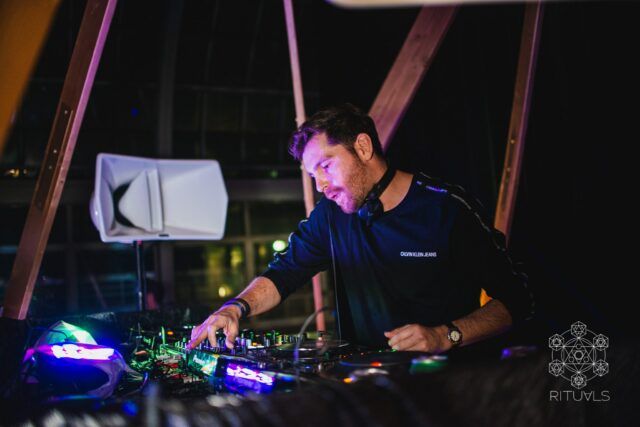
Tell us a bit about your DJing. What format/kit do you usually use? What style do you play?
I use 3 CDJs and either a Pioneer DJM-800 or Allen & Heath mixer – pretty standard. But recently, I’ve played a lot with Pioneer DJ’s new DJM-V10 and I must say I really enjoy it. I don’t know why, but I never got used to rotary mixers. Not that I don’t like the sound, but my body feels really uncomfortable in terms of the position of my arm. I just like playing with faders.
My format is mostly WAV and AIFF files. Only when I am not sure if I will ever play a certain track will I buy MP3s. I like to play lots of different genres, like Deep House, Organic House, Indie Dance, Progressive and some little African grooves, all in one set. I really like to play “journeys”. A friend of mine said: “Matthias you play lots of different music, but it always sounds like you.” This is the best compliment you can get as a DJ.
In terms of equipment, what do you bring with you to gigs?
Actually, my setup is pretty simple. I come with an SSD hard drive and 1 to 2 backup USBs, headphones, and sometimes a Strymon blueSky when I play with an Allen Heath Xone:92 because it doesn’t have any effects.
What’s the worst technical hitch you’ve ever had DJing? How did you deal with it?
There are maybe two situations that both end up with the same result. The first situation has actually happened a few times. Somebody was dancing next to me like crazy and he/she touched the stop button with their elbow. The second one is also a classic; the DJ on before just pulled out the wrong USB whilst playing. In both situations, I didn’t do much. Sometimes when you play a long set, and the party is going crazy, it’s actually nice to have a moment like this where the music is completely off and people start screaming and clapping hands. Then I just fade a new track in with little effects and have the bass cut out for a longer time to create tension. Then… boom.
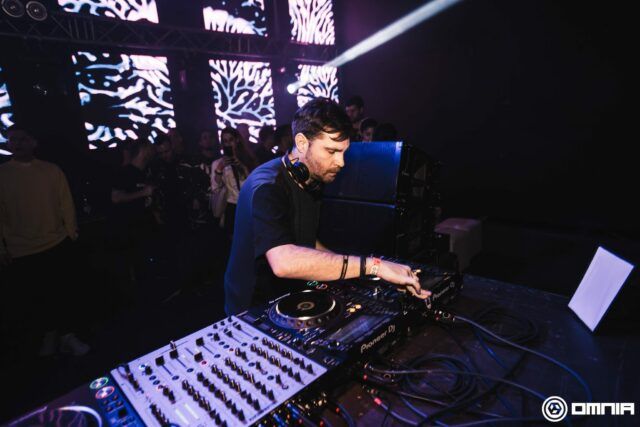
What’s the one piece of advice you’d give to a new DJ?
For me, it’s so important to know your records really well, so you know what happens at what time of the track. When you find the perfect moment for both tracks, you don’t even need to mix it with lots of adjustments. The records speak for themselves. One of the most important things to stand out these days is to find your very own and unique style of DJing. There are so many DJs out there. If you only follow trends and hype, you will always – or, at least, mostly – be the second!
And what’s the best piece of DJing advice you’ve ever received?
Do your thing and don’t be afraid to not do normal things. I remember seeing Dixon a very long time ago. He started with ambient music for one or more hours. Afterwards, he was building his set for the whole night. Even if he started at 2am peak-time, he started very slowly to have headroom for later. Nobody really leaves the party in the middle of the night. That stuck in my head.
What is it that makes a record work on the dance floor?
A record can work in so many different ways. It can be a hit with a strong hook line, or with people singing lyrics. Maybe the record isn’t that strong itself, but the way you mix it in can make it a real banger. For me, what is most important is the sound design and mixdown of a track. If it’s well-produced, clear and punchy, it always works. This is especially the case when you have a nice break, and the drums kick in afterwards. Good producers know that you need a few seconds of no low-end before the drop. Limiters need a few seconds to adjust, meaning the first 1 to 4 kickdrums are a bit louder.
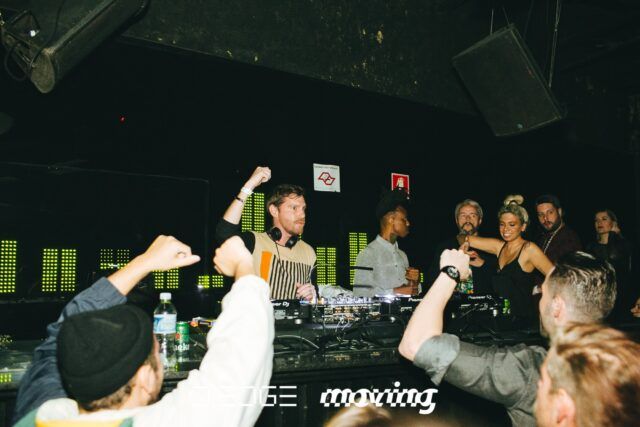
How do you feel about DJs using FX in their sets? Do you have any tricks for using FX that you can share?
I think it’s always a matter of taste and it depends on the genre you are playing. If you play more “loopy” based music with little melody, like minimal or techno, it totally makes sense to use quite a lot of effects. Speaking for myself, I don’t really use a lot of FX as I play lots of “songs”. There are always lots of melodies in the tracks I am playing, so it’s difficult to use a lot of effects.
Regarding the EQ and filters, then – tell us a bit about the role they play in your DJing:
Of course, EQing is very important, but I am also a big fan of low-cut filters and the resonance to create and build an even more ecstatic moment on the dancefloor. For the bass frequency, I mainly use filters and for the rest, I’ll use the EQ to make a smooth transition.
I try to leave the EQ flat except when I play a not-so-perfect sounding record, when I have to adjust so both tracks sound kind of the same.
Do you do much live looping or re-editing? Any tips for using loops while Djing?
Yes, I do use looping, but not very much to be honest. I mostly loop at the beginning and at the end of the track to have a smoother transition. I just love flawless and trippy mixes. In the middle, I don’t use it a lot as I play lots of melodies and let the track speak for itself. If a record has a weird and very fast ending, I even prepare the loop and put an emergency loop in just in case. But this doesn’t happen very often.
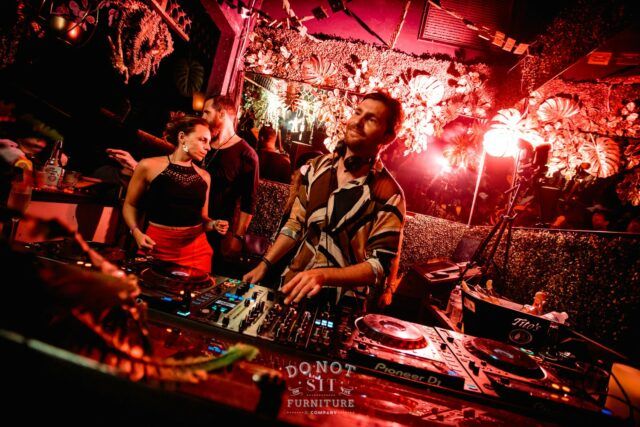
Do you change your DJing style depending on the size of the room?
For sure. For example, at Watergate Club in Berlin where I am a resident DJ, I play differently in each room. When I play early on the Waterfloor (which is the smaller room), I play a longer journey with really deep records. Also, the transitions are very smooth, with less low-cut filters here. On the main stage, you have to play faster and stronger from the beginning and then I find myself making faster transitions. When I play bigger festivals, I also play way more “huge-sounding” records with more reverbs and a more proggy feel, but actually I love small and intimate parties. It’s way more challenging. If you play in front of 5,000 people and 3,000 are leaving you still have 2,000. Hahaha. If you play for 50 and 30 are leaving, then you have a problem.
Tell us your favourite place to DJ.
It always depends on the situation and the mood, so I don’t really have a favourite place. I really love South America because people are super passionate about music and parties. Most of the parties over there are super huge, you barely find a party under 1,000 people. On the other hand, I like small underground clubs and parties which you find a lot here in Berlin. It’s a different vibe – way more intimate and intense.
What is your ideal DJ booth like?
I like it more spacious and ideally made of concrete or rock-solid wood. There should be enough space for a minimum of 3 CDJs and at least 30-50 cm space to the end of the table for drinks 😉 Better is to have another table in the back or to the side. Monitor speakers should be as high as my ears and more in front of me, like in my studio.
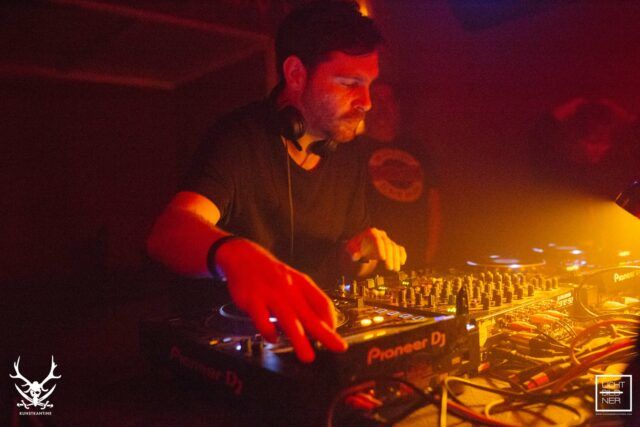
How do you source your music?
I played vinyl for a very long time and still have a lot at home, but I don’t really go record shopping anymore because I feel much of the music I play doesn’t isn’t really produced on vinyl these days. So, I check the usual online stores and listen to promos, but this is really time-consuming. I also listen to a few DJ sets online or in the real world. If I like a track, I Shazam it like normal people. What I love is when you listen to a DJ you are not really into, but then they play 1 track out of 30 that fits into my DJ sets.
Do you use Rekordbox? If so, do you compile playlists?
Yes, for sure. I have folders for different genres, types of parties, and also for each month of the year for new tracks. I don’t really make folders for artists. If an artist comes into my mind, I search for them. Sometimes I also save histories from a special set I played or podcasts I made.
Besides that, I prepare a lot of new tracks in Rekordbox like starting points or loops. One secret I can tell is that I sometimes put emergency loops at the very end of a track, especially tracks which have a weird and quick ending. It’s good to have something like this. It’s tough to find that perfect end loop whilst playing live.
And finally, what does DJing mean to you?
It means everything to me. Before I started DJing, I was very shy and barely looked at the crowd. Now it’s the complete opposite. I can play the music I love and express myself.
Matthias Meyer’s new release with Budakid, ‘Sweet Ease’ / ‘Hybrid Society’, is out now on Watergate Records and available to buy and stream. Grab it here.





